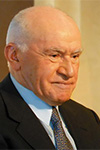
Bakoulev Center for Cardiovascular Surgery of the Russian Academy of Medical Science,
Moscow, Russia
Winner of the Lenin and State Prize, Honored Scientist of Russia, Academician of RAMS, chief cardiac surgeon of the Ministry of Health, MD,
-
Psychological factors and outcomes of coronary surgery
-
Although heart surgery is one of the most effective methods in treating cardiovascular diseases, more than 50% of patients have problems in personal, social, professional adaptation after surgery (Pogosova, 1996).
According to recent studies, psychological factors contribute significantly to negative outcomes of coronary surgery. The main factors are: depression, anxiety, personal factors and character traits, social isolation, and chronic life stress (Blumental, 2003; Connerney, 2010; Contrada, 2008; Cserep, 2010, Gallagher, 2007; Hoyer, 2008; Pigney-Demaria, 2003; Rozancki, 1999; Rymaszewska, 2003; Viars, 2009, Zaitsev, 1997).
The aim of the article is to describe the association between psychological factors and the outcomes of coronary surgery. We have studied how the patient’s attitude towards forthcoming open heart surgery is associated with the outcomes.
We have picked out four types of attitude towards forthcoming heart surgery: 1) pessimistic (no belief in recovery, surgery is threatening, damaging), 2) indifferent (no belief in recovery, surgery will not change anything), 3) optimistic but not realistic (exaggerated expectations, belief in full recovery), 4) optimistic and realistic (adequate expectations, belief in improvement).
The study has shown that patients with optimistic-realistic attitudes towards forthcoming heart surgery have better outcomes, better emotional status, and shorter stays in hospital.
DOI: 10.11621/pir.2013.0414
Keywords: heart surgery, nocebo effect, depression, anxiety, postoperative period
-









